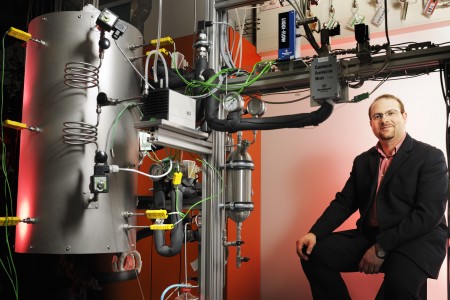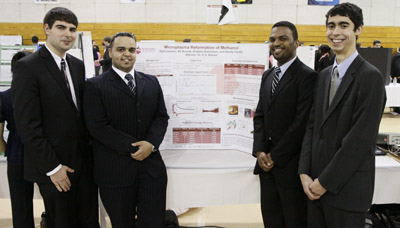May
25
Better Cheaper Hydrogen Production Large & Small
May 25, 2011 | 4 Comments
Two new hydrogen production methods made news this week, one to be small enough to carry and one industrial scale.
The industrial size process comes from Dr. Mohamed Halabi a freshly minted PhD at TU Eindhoven in the Netherlands. The paper is his PhD dissertation, “Sorption Enhanced Catalytic Reforming of Methane for Pure Hydrogen Production — Experimental and Modeling.”
Using newly developed catalyst and sorbent materials at lower temperatures (400–500º C) and pressures (1.5–4.5 bar) in a fixed bed reactor than the industrial steam reforming process, the new reactor is showing efficient H2 production. The experimental results show that direct production of high H2 purity and fuel conversion (at >99%) is achieved with low levels of carbon oxides impurities (<100 ppm).
Halabi explains in his own words, “Direct production of high purity hydrogen and fuel conversion greater than 99.5% is experimentally achieved at low temperature range of (400 — 500º C) and at a pressure of 4.5 bar with a low level of carbon oxides impurities: less than 100 ppm.” Halabi’s enormous reduction of reactor size, material loading, catalyst/sorbent ratio, and energy requirements are beneficial key factors for the success of the concept compared to the conventional technologies used today. Smaller sized hydrogen generation plant designs seem to be feasible for residential or industrial applications operated at a relatively low pressure, of less than 4.5 bar.
The other point over looked is the process may well be operated “on demand” negating in large part or entirely the need for hydrogen storage.
The process occurs in a packed bed reactor using a Rhodium-based catalyst and a Hydrotalcite-based sorbent employed as a new system of materials. Hydrogen is produced on the active catalyst and the cogenerated CO2 is effectively adsorbed on the sorbent, thus preventing any CO2 emissions to the atmosphere.
Halabi, working in collaboration with the Energy Research Centre of the Netherlands (ECN), has demonstrated the feasibility of producing hydrogen through the proof of concept stage and has acquired his PhD for the work.
Halabi’s work is welcome, as the energy needed to drive steam reforming would be greatly reduced, and the scale can run from small to huge. The unit still needs high temps, 4 to 5 times that of boiling water, but that’s better than 8.5 times and the subsequent treatments needed to get the hydrogen away from the carbon and oxygen which wind up as CO2 in both processes. Dispensing with the sorbent loaded with CO2 isn’t made clear yet.
Capitalizing on the unique properties of microscale systems, the students have invented a microreactor that converts everyday fossil fuels like propane and butane into pure hydrogen for fuel cell batteries. These batteries are not only highly efficient, but also can be replenished with hydrogen again and again for years of resilient performance in the field.
Current methods for generating fuel cell hydrogen are expensive, technically sophisticated and run some risk because of the need for high temperatures and a vacuum to produce the necessary chemical-reaction-causing plasmas. Once in a container, hydrogen is a highly volatile substance that is dangerous and expensive to transport, not something a soldier would like to carry.
Today’s U.S. soldiers can be carrying up to 80% of the gear weight in batteries. Thus the Army has an intense interest in replacing the current paradigm of single-use batteries with a reliable, reusable power source. The Stevens team’s microreactors have the potential to provide American soldiers with a dependable way to recharge the batteries for the critical devices that keep them safe, reduce waste from disposable batteries, and perhaps have a power source that could last for years.
The advanced reactors are built using cutting-edge microfabrication techniques, similar to those used to manufacture plasma television screens that use microscale physics to produce plasma under normal atmospheres.
The team is already successful at producing hydrogen from methanol. After gasifying methanol by suspending it in hot nitrogen gas, the mixture is drawn into a 25µm channel in the microreactor. There, it reacts with plasma to cause thermal decomposition, breaking down the methanol into its elemental components.
Next the team is conducting tests to see what kinds of yields are realizable from various starter fuels. Eventually, soldiers will be able to convert everyday liquid fuels like propane or butane, fuels commonly found on military bases, into high-potency juice for portable fuel cell batteries. That’s good, but methanol would do well enough.
A little bit of any those fuels would go a long way when run through a fuel cell. On demand hydrogen production would for the most part solve the hydrogen storage dilemma.
Comments
4 Comments so far




i am looking h2 plant 200kva power production per hrs give me details and power production how much per unit approx
C’etait juste par coincidence que je t’ai vu sur net et j’etais tres surprise
Are you making these for commercial applications yet
Rated output? Can it be applied in electric car batteries and power generation? What is the cost? Delivery period?